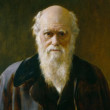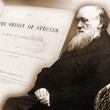Darwin’s Blind Spot
by Gerard M. Verschuuren
Filed under Evolution

It is a well-known fact that Charles Darwin, the author of that famous, and at the same time infamous, book entitled On the Origin of Species, used to be all over the religious map during his lifetime (1809-1882). Darwin’s personal beliefs remain ambiguous. I think what expresses his ambiguity best is what he wrote in a letter to J.D. Hooker (1861): “My theology is a simple muddle; I cannot look at the universe as the result of blind chance, yet I can see no evidence of beneficent design, or... Read More
Morality Is Not a Biological Issue
by Gerard M. Verschuuren
Filed under Morality

Modern biology makes us believe that we descended from the animal world and that we are nothing more than glorified animals. However, even if we did descend from the animal world, that doesn’t mean all our characteristics were transferred to us through genes and umbilical cords. For example, our anatomy and physiology did come from there, but what about our rationality and morality? In this article, I will focus on morality alone and argue that what sets us apart from the animal world is exactly... Read More
Can Darwinism Survive without Teleology?
by Gerard M. Verschuuren
Filed under Evolution

Ever since Darwin, the concept of teleology has been suspect among biologists. What is so controversial about teleology? Most likely, its history! From the earliest Greek philosophers on, it was widely believed that the world must have a purpose because, as Aristotle would put it, “nature does nothing in vain,” and neither does God, as a Jew or Christian would say. In this often misunderstood view, any change in this world is due to final causes that move things to an ultimate goal, a... Read More







